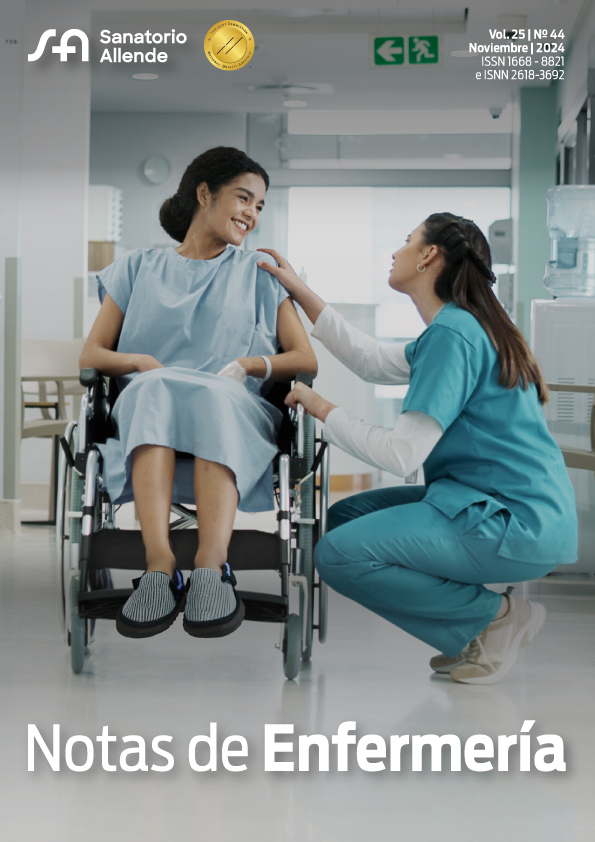Academic Stress in Bachelor of Nursing Students before the Structured Objective Clinical Examination.
DOI:
https://doi.org/10.59843/2618-3692.v25.n44.46383Keywords:
stress, students, mental health, nursing, Academic SuccessAbstract
Objective: identify academic stress in second-year Bachelor of Nursing students before the Structured Objective Clinical Examination. Methodology: descriptive, transversal. Non-probability sampling for convenience. The total sample was 65 students applied through surveys to students who are studying the second year of their Bachelor's Degree in Nursing. The variables were grouped into sociodemographics, subjects taken, academic stress level, stressful situations, physical symptoms, psychological symptoms, behavioral reactions, and coping strategy. Result: students expressed 63% of their perceived level of stress; 54% identified overload and teacher evaluations; drowsiness or greater need to sleep 54%; 46% identified feelings of anguish, anxiety or despair; eating problems related to the increase or decrease in the consumption of usual foods 51%; strategy most applied in stressful situations: the development of a plan and execution of tasks 51%. Conclusions: through this study, it was evident that teaching at the university level should also include education on control strategies in stressful situations, in the same way that teachers should be instructed to identify manifestations of stress and apply strengthening and recovery actions. safety towards the student.
Downloads
References
1. Rull M.A. , Sanchez M.L. , Cano Valdes E. , Chávez Méndez M. , Hidalgo Montiel P. Vista de Estrés académico en estudiantes universitarios [Internet]. Psicologiaysalud.uv.mx. 2021 [citado el 26 de abril de 2023]. Disponible en: https://psicologiaysalud.uv.mx/index.php/psicysalud/article/view/584/1008
2. Jerez-Mendoza M., Oyarzo-Barría C. Estrés académicos en estudiantes del Departamento de Salud de la Universidad de Los Lagos Osorno Rev. Chil. Neuro-Psiquiatr. [Internet]. 2015 [citado el 26 de abril de 2023];53(3):149–57. Disponible en: https://scielo.conicyt.cl/scielo.php?pid=S0717-92272015000300002&script=sci_abstract
3. Barzallo Sánchez J.L., Moscoso Zúñiga C.I. Prevalencia de estrés académico, factores de riesgo y su relación con el rendimiento académico en los estudiantes de la escuela de medicina de la Universidad de Cuenca en el 2015 [Internet]. 2015 [citado el 26 de abril de 2023]. Disponible en: http://dspace.ucuenca.edu.ec/handle/123456789/23899
4. Arias C., Zitlally A. Estrés Académico y Ansiedad en Estudiantes de Licenciatura en Enfermería. Tesis de Maestría. [Internet] 2021 [Consultado 25 Abr 2023]; p 1-56. Disponible en: https://repositorioinstitucional. buap.mx/handle/20.500.12371/11807
5. Teque- Julcarima M.S., Gálvez- Díaz N., Salazar-Mechan D.M. Estrés Académico en Estudiante de Enfermería de Universidad Peruana. Rev. Medicina Naturalista. [Internet] 2020 [Consultado 25 Abr 2023]; Vol. 14: p 1-6.Disponible en: https://dialnet.unirioja.es/servlet/articulo?codigo=7512760
6. Castillo- Ávila I.Y., Barrios- Cantillo A., Alvis- Estrada L.R. Estrés Académico en Estudiante de Enfermería de Cartagena, Colombia. Art. Investigación Enf. [Internet] 2018 [Consultado 2 Abr 2023]; p 1-11. Disponible en: https://acrobat.adobe.com/link/review?uri=urn:aaid:scds:US:40f8ce74-96d3-300c-9824-71e80327fb19
7. Moscoso- Zúñiga C.I. Prevalencia del Estrés Académico en Estudiantes de Medicina, Asociado al Rendimiento Académico. Rev. Médica H.J.C.A. [Internet]. 2015. [Consultado 25 Abr 203]; Vol. 10: p. 89. Disponible en: https://acrobat.adobe.com/link/review?uri=urn:aaid:scds:US:3dec063d-537b3ee6-827a-78fd424d48eb
8. OPS, O.M.S. Salud Mental. [Internet].[Citado 25 Abr 2023]. Disponible en: https://www.paho.org/es/ temas/salud-mental
9. Gutiérrez-Roda J.A., Montoya-Vélez L.P., Toro B.E., Briñón- Zapata M.A., Rosas Restrepo E., Salazar-Quinteros L.E. Depresión en Estudiantes Universitarios y su Asociación con el Estrés Académico. Rev. CES Medicina. [internet] 2010 [Consultado 25 Abr 2023]; Vol. 24: p. 7-17. Disponible en: http://www.scielo. org.co/scielo.php?script=sci_arttext&pid=S0120-87052010000100002
10. Ramos Ticcla F. Estrés académico y formación profesional. Academic stress and professional training. [Internet].2020. [Consultado 2023 My 02]. Vol.(16). P.94-98. Disponible en: http://scielo.sld.cu/pdf/rc/ v16n77/1990-8644-rc-16-77-93.pdf
11. Román Collazo C.,A. Ortiz Rodríguez. Hernández Rodríguez. El estrés académico en estudiantes latinoamericanos de la carrera de Medicina. Revista Iberoamericana de Educación.[Internet].2018.[Consultado 2023 My 02]. P.1-8. Disponible en: https://rieoei.org/historico/deloslectores/2371Collazo.pdf
12.Restrepo J., Sánchez O.A., Castañeda-Quirama T. Estrés Académico en Estudiantes Universitarios. Res. de Investigación. [ Internet] 2020. [ Consultado 2023 My 02]; p. 1-25. Disponible en: http://bibliotecadigital. iue.edu.co/bitstream/20.500.12717/2042/1/1331-Texto%20del%20art%c3%adculo-5268-1-10-20210301.pdf
13. Escobar-Zurita E., Soria de Mesa B., López Proaño G., Peñafiel-Salazar D. Manejo del estrés académico. Atlante [ internet] 2018 [consultado 2023 Abr. 18]; Disponible en: https://www.eumed.net/rev/atlante/2018/08/estres-academico.html?fb_comment_id=1881566745289288_4030013307111277
14. Barraza-Macías A. Inventario SISCO del estrés académico. Propiedades psicométricas. Revista Psicologiacientifica.com.2007. [Citado 08 sept 2022].9(13). Disponible en: https://www.psicologiacientifica.com/ inventario-sisco-estres-academico-propiedades-psicometricas
15. Guzmán-Castillo A., Zavala S.W., Bustos N.C., Castillo-Navarrete J.L. Inventario SISCO del estrés académico: revisión de sus propiedades psicométricas en estudiantes universitarios. Terapia Psicológica. 2022. [Citado 08 Sept. 2022], vol. 40,2. p. 197-207. Disponible en: https://acrobat.adobe.com/id/urn:aaid:sc:VA6C2:e3f17713-2f58-4120-882f-9cae34af040b
Downloads
Published
Issue
Section
License
Copyright (c) 2024 Sanatorio Allende

This work is licensed under a Creative Commons Attribution-NonCommercial 4.0 International License.
Those authors who have published with this journal, accept the following terms:
- Attribution — You must give appropriate credit, provide a link to the license, and indicate if changes were made. You may do so in any reasonable manner, but not in any way that suggests the licensor endorses you or your use.
- NonCommercial — You may not use the material for commercial purposes.

